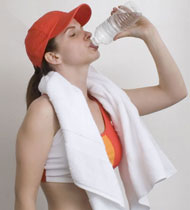 You train hard, learn about the latest techniques and make sure your equipment is top-notch. You work hard to be good at your sport. But have you fueled your body for the demands you place on it?
You train hard, learn about the latest techniques and make sure your equipment is top-notch. You work hard to be good at your sport. But have you fueled your body for the demands you place on it?
Before the event
In addition to eating well each day, the food you eat before training and competitions is particularly important. Before an event, you want to top off energy stores in your muscles and liver, provide energy for at least the beginning of your event, keep yourself hydrated and prevent hunger. Practice eating different foods before a workout to see what foods or combinations work best for your workout, your stomach and your goals. Aim for 50 to 300 grams of carbohydrates before an event (check the nutrition facts panel for the amount of carbohydrates). Avoid eating moments before your event because your blood sugar may drop, causing you to "bonk" or "hit the wall." Instead, eat about an hour beforehand and try choosing low-fiber foods to avoid stomach discomfort.
Some pre-event food ideas include a small bagel with jelly and a banana (75 grams of carbohydrates); a small bagel with peanut butter and jelly, a banana, a cup of yogurt and fruit juice (150 grams of carbohydrates); 2 cups oatmeal made with 1 cup milk; a piece of toast with jelly, an orange and 2 cups of yogurt with raisins and a glass of juice (300 grams of carbohydrates).
Hydration is also important before the event. In the two hours leading up to the activity, drink up to 24 ounces of fluid. Then, 15 minutes before it, drink another 8 to 16 ounces of fluid.
During exercise
You may need to eat to supply your body with energy during exercise. You also should be rehydrating. You want about 4 to 8 ounces of fluid every 20 to 30 minutes. Water is typically adequate, but if your event is more than 90 minutes or you are sweating a lot, you may need a product with electrolytes, such as a sports drink or gel. If you choose to refuel your body, select foods, sports drinks or other similar products that are easy to tolerate. Your body will need about 20 to 45 grams of carbohydrates each hour.
After the event
After exercise is another key time to fuel your body. Within 20 minutes of working out, reach for some carbohydrates and protein. Recovery drinks, crackers with peanut butter, apples and cheese or a glass of chocolate milk are great sources of carbohydrates and protein. The goal is to consume about 30 grams of carbohydrates and 7 to 8 grams of protein after working out so your body can recover more quickly. Every two hours after exercise, eat a combination of carbohydrates, protein and fat. This will help speed recovery, refuel your body and better prepare you for more exercise.
The tips above are general sports nutrition information. Different types of sports may have slightly different nutrition requirements, but a sports dietitian, a coach or another qualified professional will be able to give you more information, if you are interested.